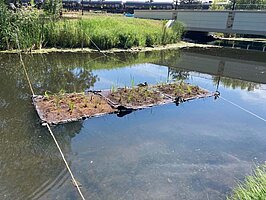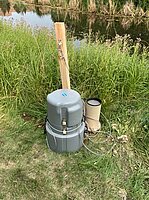Floating Treatment Wetland Systems in Cold Climate Regions: A Case Study on English Coulee in Grand Forks, North Dakota
Floating Treatment Wetland Systems in Cold Climate Regions: A Case Study on English Coulee in Grand Forks, North Dakota
The primary objective of this project was to determine effectiveness of a Floating Treatment Wetland (FTW) system, specifically in the case of the English Coulee in Grand Forks, ND. Over the course of this experiment two pilot scale FTW systems were set up in the coulee and monitored over the course of several months (May until September in 2021). This study primarily will look at nitrate and phosphate levels as a measure of performance by the FTWs. Data was also collected on how the plants responded to environmental conditions, in the cold weather region of North Dakota. The data collected will help determine the optimal plant species for a theoretical full-scale system as well as the removal efficiency of that system. The results thus far show Juncus effusus and Leersia oryzoides as optimal candidates for full scale design showing the highest survival and growth rates. At this stage there is little to no difference in upstream nutrient concentrations. This is due to the small size and unestablished root systems. With each successive growing season, the roots will become more established, and the plants can grow to larger sizes, improving the FTW efficiency. As these plants continue to grow next season, growth rate and nutrient removal will continue to be monitored to help better understand the impact of this system and the potential for a full-scale design. As such, more time and data collection is needed.



Lim Yeo Howe
Civil Engineering
Upson Hall II Room 260D
243 Centennial Drive Stop 8115
Grand Forks, ND 58202-8115
Phone: 701-777-3998
Email: yeo.lim@und.edu


